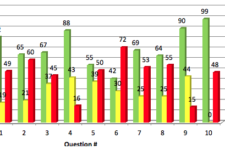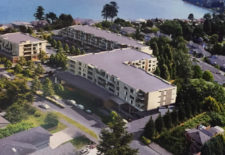Peninsula Affordable Housing Town Hall
by Sue Stroud, citizen reporter
On a slushy February evening at Mary Winspear Centre in Sidney, a well-attended town hall took place to learn about and discuss the hot-topic of housing affordability – specific to the Saanich Peninsula.
The public forum was the first after the release of the Saanich Peninsula Affordable Housing Needs Assessment. The forum was hosted by Saanich North and the Islands MLA Gary Holman with presentations by both MLA David Eby, Official
Opposition Housing Spokes-person, and the report’s author Marika Albert, Executive Director of the Community Social Planning Council. The assessment was carried out in 2016 by the Planning Council with funding provided by BC Housing and Canada Mortgage and Housing grants.
Housing should not be able to be used as an investment, this is what is driving up costs ~ Dave Eby, MLA
“Our report outlines the substantial gap between the need for and supply of affordable housing, particularly for the thousands of low and modest income families living on the Peninsula,” said Albert as she presented a slide show explaining the assessment to the crowd. She went on to break-out the specifics of needs and availability in all of the income groups of families on the Peninsula.
“There are over 550 families on the Peninsula spending over 50% of their income on housing and the situation is even more dire for First Nations,” said Holman.
Some of the Peninsula-specific challenges around creating affordable housing in the region included the need to protect farmland from sprawl, parking and traffic flow issues, and access to amenities and needed services such as schools, doctors, hospitals.
After the slide show the meeting continued with a lively presentation by Eby. “It doesn’t matter if you’re a renter, trying to buy, or wondering where your children and grandchildren will be able to live, almost everyone in British Columbia is hurt by this housing crisis in some way. These problems didn’t show up overnight, they have been building for years, and it is entirely due to the negligence of this provincial government that we are in the dire situation we are in today,” Eby said bluntly.
Eby explained the affordability-adverse domino effects of foreign investment in Vancouver. “The homes of engineers and doctors were being sold to investment firms and the engineers and doctors moved into the homes of ordinary middle class workers; middle class workers moved in to lower income areas [a process known as gentrification] and the lower income renters were pushed into the streets.” He explained that the Island is being affected by Vancouverites who have been pushed out of the Vancouver market and as the process continues you end up with tent cities like the one recently dismantled near the Victoria Court House.
“Housing should not be able to be used as an investment, this is what is driving up costs,” said Eby, “in
Tsawwassen single family homes increased in cost 100% in a single year due to such speculation. It is not a fair situation to extort from people all of their income just to keep a roof over their head.” He added, “Unfortunately this government is beholden to private developers for their political fortunes.
“It’s a serious issue because the lack of housing is cannibalizing other sectors; when tech workers can’t afford housing our tech industry can’t thrive.”
When looking towards solutions many were identified earlier in the evening including densification in designated townsites, legalization of suites, variances for parking, easy access to transit, developing with non-profit partners and joint funding with various levels of government.
In Eby’s presentation he noted that one easy solution would be to remove current legislative barriers that stand in the way of BC universities and colleges borrowing money to build student housing. More campus housing would move students out of the regular rental housing market freeing up units for others.
But Eby felt that the new Foreign Buyer Tax isn’t a solution, saying that it is inherently unfair. “It makes whole groups of legitimate buyers second class citizens.” He explained that non-Canadians live and work in Canada. They buy homes and contribute to our communities through work, volunteering and paying taxes and they are now facing an extra penalty for owning a home. Eby added that he felt that, “Knee jerk solutions aren’t the answer.” He noted an empty-home tax created in Paris, France, that quickly saw an entire new business spring up offering to keep houses looking lived-in by having lights turn on and off automatically and staging homes to make it look as if someone lived there.
THE THREE MAIN CONCLUSIONS OF THIS ANALYSIS ARE:
1. There is an urgent and immediate need for more on-reserve housing for First Nations.
2. There is an immediate need for transitional housing for women and children fleeing violence on the Peninsula.
3. There is a current and growing need for low-income rental housing for seniors and families on the Saanich Peninsula. In 2010, there were 555 households4 spending more than 50% of their annual household income of shelter costs – these households are at high-risk of experiencing housing instability and homelessness. The number of individuals and households on housing wait lists and using the food bank indicate that income levels are not high enough to cover basic living costs.
The evening ended with a lively discussion including comments by Kay Melliship of the Greater Victoria Housing Society, several local councillors and audience members. One speaker noted that there are often dire consequences when someone has to move away from friends and family support networks in order to find housing. Another mentioned the fact that BC Housing rules do not allow elderly siblings or friends to live together unless one is the legal caregiver for the other. As a result two full units are needed to house them with two kitchens, two washrooms, etc., whereas one unit with two bedrooms would save space, costs and building resources.
“The issue of housing affordability is a top priority for Peninsula residents. I am more than happy to help any developer or society approach the different levels of government for funding,” said Holman
Both Stephen Roberts, candidate for the BC Liberals in Saanich North & the Islands and Adam Olsen, candidate for the Green Party, were present though neither spoke.
The Saanich Peninsula Affordable Housing Needs Assessment can be found HERE
SVO covered the release of the assessment in a story in December, 2016 found HERE


